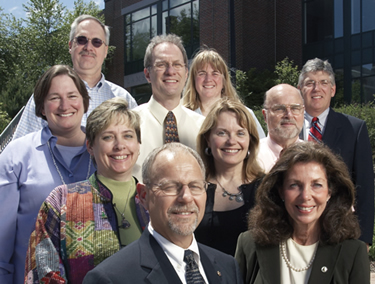by Kristin Proulx Jarvis

Representing many of the College of Graduate Studies programs, left to right: (back row) Steve Kahl; Gary Goodnough; Trish Lindberg; Leo Corriveau; (middle row) Kathleen Norris; Cheryl Baker; Dennise Maslowkowski; Gary Corcoran; and(front row) recent CAGS graduates Kenneth Darsney and Sandra McGonagle on the steps to Lamson Library.
For PSU’s College of Graduate Studies, metamorphosis has taken on many forms. First, there’s the name change, the result of a two year self-study and external review, which transformed Graduate Studies and Community Outreach into the College of Graduate Studies. Then, there’s the new location. This summer, Graduate Studies moved from Hogan House to the former Health Services building, a larger space that accommodates a growing faculty and staff, and increasing graduate registrations.
It’s unmistakable: The College of Graduate Studies is growing, its reach spreading across the state and into new fields, professions and partnerships. Innovative graduate programs and collaborative projects not only provide more opportunities for PSU students, but advance the University’s role in the region and the state.
“Part of being a regional university is providing service to the community, and helping to meet the community’s professional goals and needs,” said Dennise Maslakowski, associate vice president for the College of Graduate Studies. She cited some of the numbers associated with this growth: The College of Graduate Studies currently receives more than 6,500 course registrations each year, boasts a faculty of more than 170 and offers 75 degree and certificate programs in education, business, the arts and sciences. Graduate Studies also partners with dozens of organizations to support professional and economic development, leadership and research opportunities and additional programs in the arts, business, science and education.
A new collaborative program is a partnership with Franklin Pierce College to offer a Doctor of Arts degree in transformational leadership for professionals in education, business, health care, community leadership and other fields. Other new graduate programs include M.A.T. degrees in art education and science education; M.S. degrees in criminal justice, science education, applied meteorology and environmental science and policy; an M.Ed. in music education, which grew out of the yearly New England Band Director’s Institute held each summer at PSU; an MBA certificate in health care administration; a certificate program in school psychology (which is helping to address a critical shortage of school psychologists in New Hampshire); and a certificate program in athletic administration (in partnership with the New Hampshire Interscholastic Athletic Association and the New Hampshire Technical Institute).
The growth of Graduate Studies also means that more students across the state have access to PSU courses through online options, on- and off-campus institutes, innovative residential professional development opportunities and partnerships with other institutions of higher education.
To meet the needs of adult learners and working professionals, approximately 40 percent of all graduate classes are offered off campus or online. PSU currently works with several online learning organizations, and with the state Department of Education and New Hampshire Public Television to participate in E-Learning for Educators, a five-year initiative funded by the federal Ready to Teach program. Off-campus courses are held all around the state.
PSU’s course offerings in Waterville Valley are one example of how the College of Graduate Studies is exploring new options for course delivery. These residential courses last three or four intensive, full days each. Built into each day’s schedule are times for reading and reflection, student presentations, team-building activities and recreation. Before and after meeting their classmates face-to-face at Waterville Valley, students complete online coursework.
Other courses and institutes make use of team-teaching and nontraditional instructional techniques that emphasize collaboration, student participation and the connections between professional fields and disciplines, from arts and education to alternative health, play therapy, environmental science and heritage studies. For example, Graduate Studies recently partnered with the Arts Alliance of Northern New Hampshire to offer “Every Thing Speaks,” a multi-disciplinary institute on teaching with material culture.
The growth and transformation of the College of Graduate Studies reflects PSU’s own transformation from a college to a comprehensive, regional university. Dr. Leo Corriveau, executive director of the CAGS program in the College of Graduate Studies, says he is proud of this growth and the benefits it provides to the region and the state.
“The College of Graduate Studies is building leadership capacity all through the educational system, from kindergarten to the doctoral level. This growth just would not have happened if our students did not find much value and quality in their graduate experiences,” said Corriveau. “We’re reaching out to help the state in education, business, science and the arts, and developing tremendous influence and credit throughout New Hampshire.”








